- Home
- Michelle Tea
Mermaid in Chelsea Creek Page 12
Mermaid in Chelsea Creek Read online
Page 12
Chapter 13
“Do you want to come to the dump with me?” Sophie asked hopefully into the telephone.
“You definitely sustained brain damage last night if you are asking me that question,” Ella said coldly. It was the sort of tease Ella could have said in a friendly way—but she didn’t. Sophie’s stomach swirled.
“I’m sorry about last night, Ella. I didn’t mean to scare you. I know you were trying to help me—”
“Sophie, I don’t know what’s going on with you, but it’s freaky, okay?”
“Ella, it’s not that freaky, I swear,” Sophie spoke quickly, stalling, lying. It was wicked freaky. “Listen, if you just come to the dump with me today you can meet Angel, and I think you’ll understand—”
“I’ve got a lot of work to do at the beach today,” Ella said coolly.
“Oh,” Sophie was surprised. “I didn’t know you were getting a job. Where are you working?”
“On my tan,” Ella snapped. “I’m sorry you’re grounded, but I can’t stop my life just because you’re having some weird problem. And you’re right, you shouldn’t pass yourself out anymore. You can’t handle it.”
“Ella,” Sophie said. The more they fought, the more Sophie felt like a kid, just a whiny, pleading kid. The friendly part of Ella felt unreachable. “Well—okay,” she said stupidly.
“Well, okay,” Ella dully repeated, and hung up the phone. Lying on her bed, she pressed her hand to her churning stomach. When she got home last night, desperate for a remedy to the toxins she was certain had gotten into her, she drank half a pint of mouthwash. The liquid had seared a groove down her throat and into her guts and quickly retraced its steps, heaving out from her mouth and into the sink. Ella’s stomach muscles still ached from the effort, like she’d done a million sit-ups. It ached with the heaving, with the burn of the mouthwash, and with a painful knot of emotion.
On the other end, holding the dead line in her hand, Sophie’s stomach throbbed in sickening synchronicity. She and Ella had fought before, though usually her friend was eager to accept an apology. I’m sure she’ll come around, Sophie assured herself weakly. She pushed the girl from her mind, vowing to call her again, soon. She had a whole lot of work ahead of her; moping about her room all day was not an option.
* * *
“OH, MY ACHING neck,” Andrea complained, wincing, one hand kneading the soreness, the other clutching a cup of coffee. The coffee maker on the counter was full of the vile, brown liquid. Sophie didn’t like the burnt stink, but her mother could not function without it. Sophie sat at the table, drowsy, her own body aching. Angel had warned her it would, that she’d been using muscles she didn’t know she had, but at the time Sophie was so caught up in the work she couldn’t feel it. Now she felt it, a new ache in a new place every time she moved. That plus the weird feeling in her chest, her lungs she supposed, which had been full of Chelsea creek water. Her sinuses too felt clogged. The events of the night before were clear to her, her memory of them sharp, and she had no doubt that any of it had happened, was real. What she was less clear about was what it all meant. The mermaid had danced around a certain point, as had tender Livia the pigeon. Even gruff Arthur couldn’t seem to spit it out. Was Sophie meant to save humanity? She was a girl in grimy clothes, drinking orange juice from concentrate that her mom had bought five for a dollar at the supersized supermarket a town over. She hadn’t had the time to make good on her promise to arrive at the dump with better grooming; indeed, she was more dusty and tangled than the day before. She swiped a ponytail holder from her mother and lassoed the mess of her hair into a dense bun on her head, checking her reflection in a tablespoon stained brown with coffee. This was humanity’s savior?
“Wash your face,” Andrea said, reading Sophie’s mind. “I don’t want to hear it from your grandmother about how I’m not taking care of you.”
In the bathroom Sophie splashed cold water onto her cheeks and dried them with her mom’s leftover shower towel. “Ready,” she announced. Climbing into the car, she took note of the chalky white pigeon droppings splatting the roof of the car and giggled.
“You think that’s funny?” Andrea asked, annoyed. “You think I have time to bring this thing to a car wash? Not to mention the money?”
Sophie felt a wave off her mother. She arranged herself, inside, to catch it. It was like a new set of arms had grown inside her, and the arms opened in a gentle curve and caught the toss of her mother’s scratchy feelings. How the state of her car made her feel like a failure. It felt bad to drive around in a poop-mobile. She wanted to tell everyone who looked at her lousy little vehicle that she knew the droppings were there; she didn’t want anyone thinking she was the kind of person who would be oblivious to such a thing. She knew about it, she didn’t like it, and she didn’t have the time to deal with it. Or, when a pocket of time presented itself, she did something else with it. She napped, or spaced out, or watched a television program. And later she would think, I should have brought the car to the car wash. What was I doing, sitting reading the newspaper? And she would not only feel like a failure, but that the fact of her failure was her very own fault.
Sophie hopped on her mom with her real arms outstretched, her psychic arms still holding the sad bundle of emotion. She hugged her mother tight. “It’s not a big deal,” Sophie promised. “I’ll wash the car. Don’t feel so bad about it. All the cars in Chelsea have bird poop on the roof.”
Her daughter’s tenderness was too much for her—too unexpected, too unusual, too tender. Andrea shrugged her off. “It’s okay,” she lied. “I don’t feel that bad about it.” Andrea worked to harden herself to the onslaught of feelings. The problem with feelings was, first you had one, which was generally bad enough. But then you had a feeling about your feeling, and then a feelings about how you were feeling about your feeling, and then another feeling would pop up at the sight of it all, this teetering pyramid of emotion, and all of it would look wrong to Andrea, all her feelings somehow incorrect, too much or too little, too soft or too hard, and another feeling would emerge at the thought of that. It was endless, having feelings. And god forbid someone noticed you having them, as Sophie just had. Then you had feelings about that, about having been seen, and more feelings still about the other person’s feelings. Oh, it was awful. Andrea started the car, her eyes steely on the streets ahead. If she was driving she wouldn’t have to feel anything, and Sophie wouldn’t expect her to, couldn’t need anything from her in those moments but for her to drive the car, bring her safely to the dump. Sophie watched her mother shut down behind the wheel. The ring of her mother’s sadness still bounced through her body, fainter and fainter, until it was gone.
* * *
RONALD TRIED UNSUCCESSFULLY to escort Sophie up the hill and over to the tumbling shack. His ankles caught on the width of his pants and his feet shuffled like he was dancing. Ronald toppled. “Oh, great,” Sophie said aloud. She stood over the man. The booze on his breath shot up like a geyser with each exhalation. Sophie remembered what the pigeons had said, about dignity. Of all the damage the drinking was doing to Ronald, from the swell of his liver to the blood vessels bursting on the tip of his nose, Sophie thought the corrosion of the man’s dignity was perhaps the worst of all. Sophie felt a shame on his behalf as she tugged the man to his unsteady feet, a shame he didn’t know to feel at all.
“Going to see your nana?” Ronald hiccupped.
“Sure,” Sophie said, though she wasn’t. There was no point trying to actually talk to Ronald, whose very tongue was pickled from all the liquor it had lapped.
“Your nana,” he shook his head back and forth. Sophie thought he was smiling. “She is something else. Whatta lady.” He tugged from the front pocket of his filthy, baggy jeans a bottle of rum. The liquid was clear as water behind the label of a pirate.
“Did she get that for you?” Sophie asked.
“She always does,” Ronald nodded. “That’s the deal.”
* * *
“Hey there,” she said casually, but Sophie thought, She knows everything.
“I saw the mermaid,” Sophie said immediately. She’d been planning to wait, sniff things out, but Angel pretending everything was normal made her start blurting. “And the pigeons came to me, too.”
Angel smacked her forehead. “Crap!” she said. “The pigeons! It hasn’t been raining and I forgot to fill their baths on the roof.”
“Well, you better,” Sophie said. “They’re getting grimy, and Giddy feels bad about it.”
Angel tossed the goggles and headphones at Sophie, followed with a toss of gloves that smacked her in the belly and fell to the ground. “Finish this bunch of bottles,” she instructed. “I’ll be right back. Then we’ll talk.”
Angel grabbed the nozzle of a long green hose and tugged it outside. In between deafening smashes, Sophie could hear the spray of water into the glass bowls on the roof. She busted up the bottles with ease; it felt so great to make them smash into pieces, the crunch and spray of the pulverized bottles. It felt fun and destructive, like something she shouldn’t be allowed to do, but it was her job. She laughed out loud, crushing the bunch in no time. Sophie pulled off the gear and surveyed her glittering creation, the wider work room strewn with shards and sparkle. In the corner of the shack one of the junkyard cats lay lazy in the heat. It was a big orange and white cat with unusually long legs, a boxy face and ears chewed from fighting. Angel called it Creamsicle. Sophie sidled up to it.
“Hey,” she said. The cat blinked at her, then dozed its eyes. Sophie tugged her sea glass from under her shirt. It was cool and heavy in her palm. She shook the cat awake. “Hey,” she said. She showed the cat her necklace. “It’s okay. I know everything. You can speak to me.” The cat blinked, yawned and slid its pointy chin onto its long legs. It purred a light purr. Sophie shook it again with her hand, eliciting an annoyed mew. “Tell me what you know,” she ordered the cat. “It’s okay. I’m not going to freak out, okay? Just say something.” She brought the sea glass closer to the cat, who sniffed it, gave it a lick, and pulled its head away.
“Sophie,” Angel was behind her. “What are you doing to Creamsicle?”
Sophie jumped, tucking her talisman quickly beneath her shirt. “I just, I was just letting it know that it could—talk to me,” she said. It sounded dumb, but then, a flock of pigeons had escorted her home last night. She couldn’t be blamed for not understanding the rules of this magic new reality. She tucked the sea glass back under her shirt.
“Creamsicle doesn’t speak to people.” Angel smiled.
“So, the cats don’t know anything? Only the pigeons know things?” Sophie felt annoyed. “Or do, like, rats know things? Can I expect dogs to start talking to me, or bees or raccoons? Can I expect to start reading a seagull’s mind anytime soon? Will I be getting a visit from, like a UFO full of space aliens?”
“Creamsicle probably knows everything,” Angel said. “But he’s not talking.” She walked over and dumped a bucket of glass shards into the tumbler. “Hold on,” she said. She dumped a bag of grit into the machine and switched it on. The noise was a lion’s roar and they were inside the beast’s mouth. The ground beneath them was alive with the tumbler’s power. Angel came close to Sophie. “We can talk about it here,” she said, “But only when the tumbler’s on, okay? It scrambles your grandmother’s powers or something; she can’t hear when it’s going. Not just ear-hearing, but her other hearing. She can hear your feelings, your thoughts. And you don’t need to be right in front of her for her to do it.”
Sophie was alarmed at this. “She can read my feelings?”
“Yep,” Angel nodded. “Where do you think you got it from?”
“You know I do it? Do you know everything? Will you explain it all to me?”
“I don’t know everything,” Angel said sadly. “I only know my piece. I know that Kishka can spy on your insides.”
Sophie ran through a catalog of feelings as if through a violated diary, trying to gauge what her grandmother might know. “I have… bad feelings about my grandmother,” Sophie confessed. “Like, I’ve always been scared of her. Or, kind of repulsed by her.”
“She knows.” Angel nodded.
Sophie felt terrible. “Should I apologize?” She tried to conjure sweet feelings for her grandmother, but found it impossible.
“No, no,” Angel waved her hand. “It’s all as it should be, you can’t help it. Even if you didn’t know your grandmother is bad, you’d at least know she’s sort of crazy. Don’t worry about your feelings. You can’t ever change them, anyway. You can’t control them. That’s a good first thing to understand—you can’t control how you feel. It’s pure honesty, feelings. But you can block them. That’s what I can teach you.”
Sophie remembered her attempt to peek into Angel’s emotions, how it felt like diving into an empty swimming pool. “You’ve blocked yours, right?”
“I couldn’t be here otherwise,” Angel said. “You felt it, right? You ran into it yesterday. You were snooping.”
Sophie felt ashamed but Angel didn’t seem to mind. “I was glad you did that, actually,” she said. “I wasn’t sure how far along you were in your powers, or in your understanding of them. I was glad to feel you playing around with it.”
“What is it?” Sophie asked. “At first I thought there was something wrong with me. I do this—thing, with my friend.”
“The pass-out game.” Angel nodded. “Don’t, anymore. The mermaid will find you without that.”
“Did it hurt me?” Sophie asked. “Last night I was out for so long…” She thought of Ella and her heart hurt.
Angel pulled a knit cap from the back of her pants and pulled it over her head of sweaty tangles. “There is so much for you to know,” Angel said. “Have the pigeons bring you to me tonight. It’s not safe here.” Angel brought the tumbler to rest with a switch, and the echo of it rung in Sophie’s ears for the rest of the afternoon.
* * *
THE DAY WENT quickly, Sophie and Angel smashing glass silently, side by side, the sounds muffled from their foamy headphones. Sometimes Sophie would try to look into Angel, slowly, carefully, sneaking up on that hard, protective wall as if it were a living thing she could outsmart. Her sly pace prevented her from smashing against it, but Angel was impenetrable. And Angel could feel Sophie, too—every time the girl tried to pry inside, Angel would lift her head and look out from goggles, shaking her head with a smirk. “Nice try,” she mouthed above the smashing.
“I’m sorry!” Sophie hollered, though she wasn’t. She felt something, a breeze inside her.
“No you’re not!” Angel yelled, shattering an empty jug of wine.
“Was that just you?” Sophie exclaimed. She dropped her shovel, her hands crossing her body as if she could somehow hide her insides. “Did you just peek at me?”
“Yes,” Angel said. “That’s what it feels like.”
“Don’t do it again!” Sophie ordered. It felt like her brain had been cracked open, pools of thought and opinion, fantasy and memory exposed to the elements. Like she’d been singing in the shower and someone had turned the water off and pulled open the curtain.
“I won’t,” Angel promised. “Not without telling you first. But, keep trying to peek at me. It’s okay.”
And so Sophie did, becoming familiar with the perimeters of Angel’s wall. In her mind it was a steely dark gray, tall and sleek, impossible to climb, impossible to penetrate. Sophie didn’t know the wall was made from it, bu
t she imagined it was iron. She leaned in to smell its slight metallic smell. Angel laughed.
“Okay, Sherlock,” she said. “Give it a rest for a while.”
* * *
SOPHIE SPENT THE entire day at the dump without running into her grandmother. It felt strange, especially with all she’d learned. She wanted to have a normal interaction with the woman, to see if she could act normal, what with all she knew and didn’t know.
“Don’t worry,” Angel said. “You’ll have plenty of time to see your grandmother.”
“Is she really bad?” Sophie asked.
“Um, yeah,” Angel said with a little laugh. “I mean, she doesn’t think so. It’s like she’s just a businesswoman or something. She’s just looking out for number one. But, trust me. As far as the rest of the world is concerned, she’s really bad. Especially for your work in the world.”
My work in this world, Sophie thought. I’ve got work in this world. Work to do. Work that is all mine. She felt excited and anxious, filled with a pride of purpose quickly deflated by the understanding that she didn’t know quite what that purpose was. Or if she’d even want it.
Passing by the Airstream, Sophie thought, There is the lair of my wicked grandmother. Wicked people lived in lairs, didn’t they? Could an Airstream trailer be a lair? If her grandmother was so bad, wouldn’t she have a castle? A dungeon, a cave? Sophie sidled up to the trailer. She placed her hand on it, and the hot metal seared her palm. The Airstream looked like a bullet or a spaceship, and Sophie had always liked it. They were meant to be hitched to cars and dragged around the country. This one was beached, beached in a garbage dump in Chelsea. Sophie imagined it would have preferred a different life, one spent winding down roads blasted into the sides of mountains, rust-colored canyons rising and falling as far as the eye could see.

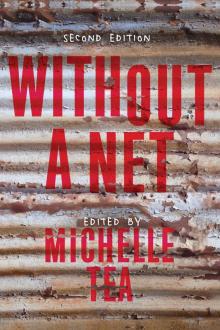 Without a Net
Without a Net Black Wave
Black Wave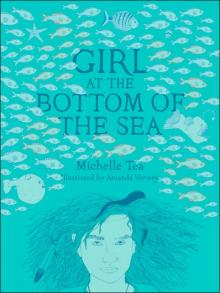 Girl at the Bottom of the Sea
Girl at the Bottom of the Sea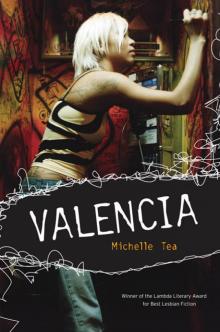 Valencia
Valencia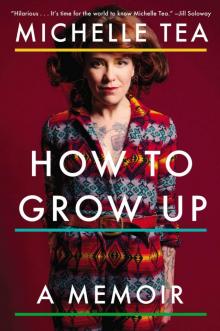 How to Grow Up
How to Grow Up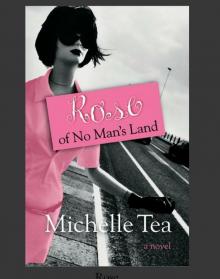 Rose of No Man's Land
Rose of No Man's Land Mermaid in Chelsea Creek
Mermaid in Chelsea Creek